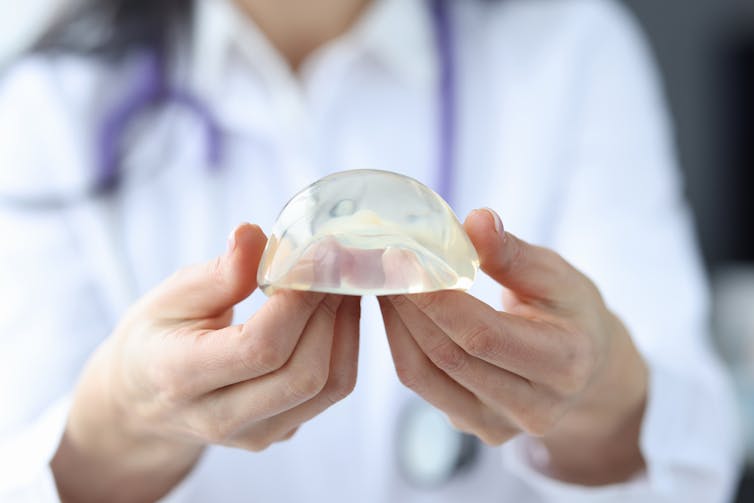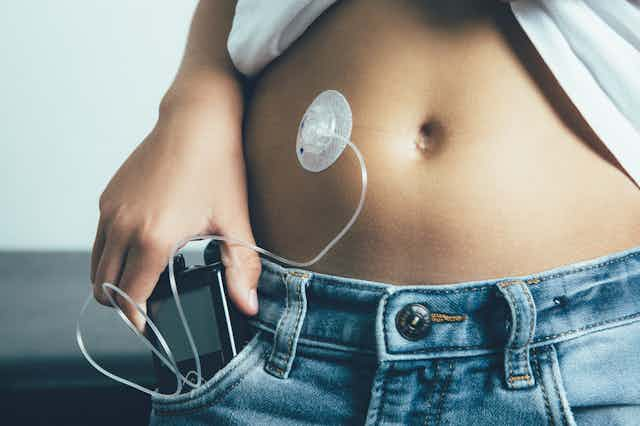Biomedical implants – such as pacemakers, breast implants and orthopedic hardware like screws and plates to replace broken bones – have improved patient outcomes across a wide range of diseases. However, many implants fail because the body rejects them, and they need to be removed because they no longer function and can cause pain or discomfort.
An immune reaction called the foreign body response – where the body encapsulates the implant in sometimes painful scar tissue – is a key driver of implant rejection. Developing treatments that target the mechanisms driving foreign body responses could improve the design and safety of biomedical implants.
I am a biomedical engineer who studies why the body forms scar tissue around medical devices. Along with my colleagues Dharshan Sivaraj, Jagan Padmanabhan and Geoffrey Gurtner, we wanted to learn more about what causes foreign body responses. In our research, recently published in the journal Nature Biomedical Engineering, we identified a gene that appears to drive this reaction because of the increased stress implants put on the tissues surrounding them.
Mechanics of implant rejection
Researchers hypothesize that foreign body responses are triggered by the chemical and material composition of the implant. Just as a person can tell the difference between touching something soft like a pillow versus something hard like a table, cells can tell when there are changes to the softness or stiffness of the tissues surrounding them as a result of an implant.
The increased mechanical stress on those cells sends a signal to the immune system that there is a foreign body present. Immune cells activated by mechanical pressure respond by building a capsule made of scar tissue around the implant in an attempt to shield it off. The more severe the immune reaction, the thicker the capsule. This protects the body from getting an infection from injuries like a splinter in your finger.
All biomedical implants cause some level of foreign body response and are surrounded by at least a small capsule. Some people have very strong reactions that result in a large, thick capsule that constricts around the implant, impeding its function and causing pain. Between 10% to 30% of implants need to be removed because of this scar tissue. For example, a neurostimulator could trigger the formation of a dense capsule of scar tissue that inhibits electrical stimulation from properly reaching the nervous system.
To understand why the immune systems of some people build thick capsules around implants while others do not, we gathered capsule samples from 20 patients whose breast implants were removed – 10 who had severe reactions, and 10 who had mild reactions. By genetically analyzing the samples, we found that a gene called RAC2 was highly expressed in samples taken from patients with severe reactions but not in those with mild reactions. This gene is found only in immune cells, and it codes for a member of a family of proteins involved in cell growth and structure.
Because this protein seemed to be linked to a lot of the downstream reactions that lead to foreign body responses, we decided to explore how RAC2 affects the formation of capsules. We found that immune cells activate RAC2 along with other proteins in response to mechanical stress from implants. These proteins summon additional immune cells to the area that combine into a massive clump to attack a large invader. These combined cells spit out fibrous proteins like collagen that form scar tissue.

To confirm RAC2’s role in foreign body responses, we artificially stimulated the mechanical signaling proteins surrounding silicone implants surgically placed in mice. This stimulation produced a severe and humanlike foreign body response in the mice. In contrast, blocking RAC2 resulted in an up to threefold reduction in foreign body responses.
These findings suggest that activating mechanical stress pathways triggers immune cells with RAC2 to generate severe foreign body responses. Blocking RAC2 in immune cells may significantly reduce this reaction.
Developing new treatments
Implant failure is conventionally treated by using biocompatible materials that the body can better tolerate, such as certain polymers. These don’t completely remove the risk of foreign body reactions, however.
My colleagues and I believe that treatments that target the pathways associated with RAC2 could potentially mitigate or prevent free body responses. Heading off this reaction would help improve the effectiveness and safety of medical implants.
Because only immune cells express RAC2, a drug designed to block only that gene would theoretically target only immune cells without affecting other cells in the body. Such a drug could also be administered via injection or even coated onto an implant to minimize side effects.
A complete understanding of the molecular mechanisms driving foreign body responses would be the final frontier in developing truly bio-integrative medical devices that could integrate with the body with no problems for the recipient’s entire life span.

